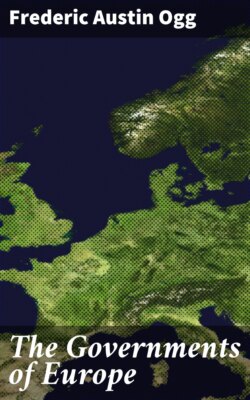Читать книгу The Governments of Europe - Frederic Austin Ogg - Страница 49
На сайте Литреса книга снята с продажи.
IV. Privileges of the Houses and of Members
Оглавление133. Nature and Extent of Privileges.—On the basis in part of custom and in part of statute there exists a body of definitely established privileges, some of which appertain to the Commons as a chamber, some similarly to the Lords, and some to the individual members of both houses. The privileges which at the opening of a parliament the newly-elected Speaker requests and, as a matter of course, obtains for the chamber over which he presides include principally those of freedom from arrest, freedom of speech, access to the sovereign, and a "favorable construction" upon the proceedings of the House. Freedom from arrest is enjoyed by members during a session and a period of forty days before and after it, but it does not protect a member from the consequences of any indictable offense nor, in civil actions, from any process save arrest. Freedom of speech, finally guaranteed effectually in the Bill of Rights, means simply that a member may not be held to account by legal process outside Parliament for anything he may have said in the course of the debates or proceedings of the chamber to which he belongs. The right of access to the sovereign belongs to the Commons collectively through the Speaker, but to the Lords individually. With the growth of parliamentary government both it and the privilege of "favorable construction" have ceased to possess practical importance. Another privilege which survives is that of exemption from jury duty, though no longer of refusing to attend court in the capacity of a witness. Each house enjoys the privilege—for all practical purposes now the right—of regulating its own proceedings, of committing persons for contempt, and of deciding contested elections. The last-mentioned function the House of Commons, however, has delegated to the courts. A privilege jealously retained by the Lords is that of trial in all cases of treason or felony by the upper chamber itself, under the presidency of a Lord High Steward appointed by the crown. The Lords are exempt from arrest in civil causes, not merely during and immediately preceding and succeeding sessions, but at all times, and they enjoy all the rights, privileges, and distinctions which, through law or custom, have become inherent in their several dignities.
134. Payment of Members of the Commons.—Until recently the fact that there was no salary attached to service in Parliament operated to debar from election to the Commons men who were not of independent means. Through some years the Labor Party was accustomed to provide funds wherewith its representatives were enabled to maintain themselves at the capital,[184] but this arrangement affected only a small group of members and was of an entirely private and casual nature. Public and systematic payment of members, to the end that poor but capable men might not be kept out of the Commons, was demanded by the Chartists three-quarters of a century ago, and from time to time after 1870 there was agitation in behalf of such a policy. In 1893, and again in 1895, a resolution in favor of the payment of members was adopted in the Commons, and March 7, 1906, a resolution was carried to the effect that every member should be paid a salary of £300 annually. But it was not until 1911 that a measure of the kind could be got through the upper chamber. Fresh impetus was afforded by the Osborne Judgment, in which, on an appeal from the lower courts, the House of Lords ruled in December, 1909, that the payment of parliamentary members as such from the dues collected by labor organizations was contrary to law. The announcement of the Judgment was followed by persistent agitation for legislation to reverse the ruling. In connection with the budget presented to the Commons by the Chancellor of the Exchequer May 16, 1911, the proposition was made, not to take action one way or the other upon the Lords' decision, but to provide for the payment to all non-official members of the House of Commons of a yearly salary of £400; and with little delay and no great amount of opposition the proposal was enacted into law. The amount of the salary provided is not large, but it is ample to render candidacy for seats possible for numbers of men who formerly could not under any circumstances have contemplated a public career.[185]
